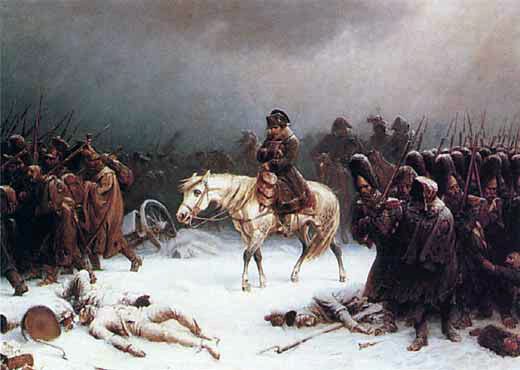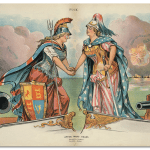On October 19, 1812, 200 years ago today, Napoleon Bonaparte was forced to admit that he had failed to defeat Russia and would have to abandon Moscow. The retreat that followed became the symbol of the suffering and folly of warfare for the rest of the century. It was immortalized by Tolstoy in War and Peace as a result of the vanity of tyrants. The invasion and retreat were responsible for one of the most famous visual documents in modern history, Charles Joseph Minard’s chart showing the depletion of the Grande Armee. Beginning with approximately half a million troops in June 1812, more than 4 out of every 5 soldiers had died by the time the French army recrossed the Neman River in December and left Russia behind.

Russia defeated Napoleon with superior strategy and logistics. As early as 1810, Minister of Defense Barclay de Tolly and Emperor Alexander I decided that they would engage in strategic retreat, destroying local crops to prevent Napoleon from obtaining food for his soldiers and fodder for their horses, and engaging only in small skirmishes. Napoleon’s success in western and central Europe was based in his ability to crush the enemy’s army quickly and decisively. The Russian policy of retreat deep into the Russian territory and refusal to engage in battle was deeply unpopular but it won the war. Alexander wavered only twice in his determination to avoid major engagement. First at Smolensk, where the French victory was not decisive enough to gain the upper hand, and then a mere 75 miles outside Moscow at Borodino. The one-day battle at Borodino on September 7, 1812 is one of the bloodiest days in the history of warfare. Estimates vary, of course, but approximately 75-80,000 men died on that day. By comparison, the bloodiest day in the US Civil War, the battle at Antietam, fifty years later on September 17, 1862 resulted in 6,500 deaths. The Russian Commander in Chief, Mikhail Kutuzov, recognized that to continue fighting would not save Moscow, so he again ordered the Russian army to retreat. A week later Napoleon triumphantly entered the ancient capital of the Russian Empire.
That triumph quickly turned to disaster. Alexander had ordered the population to evacuate so Moscow was empty. Then mysterious fires broke out in the mostly wooden city, destroying three-quarters of its buildings. There was no food and people in the surrounding villages refused to give up what they had to the foraging enemy soldiers. The final blow came when Alexander refused to negotiate with Napoleon as long as he and his army were on Russian soil. The message Alexander sent to his soldiers was:
“I will make use of every last resource of my empire; it possesses even more than my enemies yet think. But even if Divine Providence decrees that my dynasty should cease to reign on the throne of my ancestors, then after having exhausted all the means in my power I will grow my beard down to here (pointing to his chest) and will go off and eat potatoes with the very last of my peasants rather than sign a peace which would shame my fatherland and that dear nation whose sacrifices for me I know how to appreciate…Napoleon or me, I or him, we cannot both rule at the same time: I have learned to understand him and he will not deceive me.”
It was not easy for Napoleon to acknowledge that he had been outwitted by the ruler and people of the country he referred to as “the Colossus of Northern Barbarism.”
But after 35 days in Moscow, he took his leave.

Napoleon’s Retreat from Moscow, by Adolph Northern
The retreat was disorderly and deadly. More people died from disease and starvation than battle. But partisans and Cossacks harassed the retreating French army all along their devastated path. Romantic novelists and mythmakers like to blame the harsh Russian winter for the demise of the Grande Armee, but by the time temperatures dropped and it started snowing in early November, most of the damage was already done. The bitter cold of December 1812 caused great suffering but December marked only the final weeks of the six month war.
Although it took more than a year for Alexander I and his allies in central Europe to chase Napoleon back to Paris, the Russian resistance was the turning point of the Napoleonic wars. The defeat showed that Napoleon was not invincible and the retreat came to symbolize those wars’ terrible costs.
Want to read some more about Napoleon in Russia? try these:
Dominic Lieven, Russia Against Napoleon (2011)
Stephen Norris, A War of Images: Russian Popular Prints, Wartime Culture, and National Identity, 1812-1945 (2006)
Janet Hartley, Alexander I (1994)
Leo Tolstoy, War and Peace



